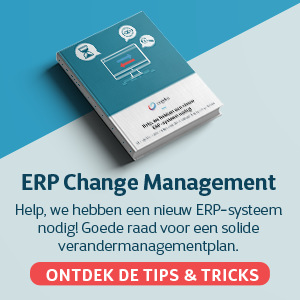Actively sharing knowledge in the food & chemicals sector is essential. Inspiring each other and working together on solutions leads to sustainable growth, not competition. In this blog, we discuss 4 common industry challenges and (even more interesting!) how to tackle them.
Challenge #1: change management
Change management turns out to be more difficult in practice than anticipated on paper. For example, you can have very clear goals, but the change process in practice is often underestimated. People don't change by themselves, you really have to convince them that they want to change themselves and not impose a change from 'above'. A joint course for all departments involved is essential, for this reason an ERP implementation can be called an organizational project rather than an IT project.
Challenge #2: fragmented data
We hear it mentioned by many customers as the biggest challenge: problems with fragmented data. System A contains data, in system B processes are regulated on the basis of that data and then we also have systems C and D that are not fully linked to each other. This ensures that a lot of time is lost in finding the right information and that you cannot make optimal use of available information. A missed opportunity!
But how do you deal with this? With Dynamics 365 you create one central environment, in which all processes and data are integrated. There is always one version of the truth. This allows you to centrally control all core processes, from purchasing to production planning.
Are you as a food company on the eve of an ERP (re)selection? Would you like to know more about the impact of an ERP and what you should take into account?
Then read the free E-Book on how to efficiently select the right ERP solution and partner.
Challenge #3: higher demands in customer service
Customers have increasingly higher demands when it comes to customer service. At many organizations, orders are still 'traditionally' received via email or telephone. The customer service department then has to process these orders manually.
There is still much to gain in this process. How about developing a portal, for example, where customers can place their orders directly? This prevents errors, is more efficient and also more customer-friendly. Through a portal, customers can order 24/7 and they always have insight into their pricing model, order history and other relevant information. You can also think of the development of new functionalities for, for example, cross- and upselling.
Challenge #4: security and the responsibility of organizations
No one can ignore the importance of good security anymore. Hacking attempts, ransomware, DDoS attacks…the impact of incidents is enormous for organizations. When you work with the cloud, this offers important advantages in terms of security. For example, Microsoft continuously invests in knowledge and tools to detect and prevent attacks. But what should not be forgotten is the responsibility of organizations themselves when it comes to security; what they do or run in the cloud.
It is important to consult and collaborate with partners, for example what an SLA means in the event of an incident. User awareness is also an important topic. They must understand the importance of security and what role they play in this. At an organizational level, it is wise to learn from other incidents. But most importantly? That's taking the subject seriously - and not waiting until it's too late!
Want to know more?
We end this blog with the same message as at the beginning: sharing knowledge in the sector is essential. We are therefore happy to help you! View all our blogs here for knowledge and inspiration, or contact us directly to discuss the possibilities for your organization.





